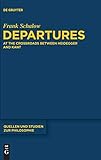Departures : At the Crossroads between Heidegger and Kant / Frank Schalow.
Material type: TextSeries: Quellen und Studien zur Philosophie ; 112Publisher: Berlin ; Boston : De Gruyter, [2013]Copyright date: ©2013Description: 1 online resource (243 p.)Content type:
TextSeries: Quellen und Studien zur Philosophie ; 112Publisher: Berlin ; Boston : De Gruyter, [2013]Copyright date: ©2013Description: 1 online resource (243 p.)Content type: - 9783110291353
- 9783110291384
- online - DeGruyter
- Issued also in print.
| Item type | Current library | Call number | URL | Status | Notes | Barcode | |
|---|---|---|---|---|---|---|---|
 eBook
eBook
|
Biblioteca "Angelicum" Pont. Univ. S.Tommaso d'Aquino Nuvola online | online - DeGruyter (Browse shelf(Opens below)) | Online access | Not for loan (Accesso limitato) | Accesso per gli utenti autorizzati / Access for authorized users | (dgr)9783110291384 |
Browsing Biblioteca "Angelicum" Pont. Univ. S.Tommaso d'Aquino shelves, Shelving location: Nuvola online Close shelf browser (Hides shelf browser)

|

|

|

|

|

|

|
||
| online - DeGruyter Carl Einstein und die europäische Avantgarde/Carl Einstein and the European Avant-Garde / | online - DeGruyter Das Artikulierte und das Inartikulierte : Eine Archäologie strukturalistischen Denkens / | online - DeGruyter Aggression in Humans and Other Primates : Biology, Psychology, Sociology / | online - DeGruyter Departures : At the Crossroads between Heidegger and Kant / | online - DeGruyter Nachrichtenlose Kulturgüter / | online - DeGruyter A Grammar of Domari / | online - DeGruyter Handbuch der Tonstudiotechnik. Band 1, Raumakustik, Schallquellen, Schallwahrnehmung, Schallwandler, Beschallungstechnik, Aufnahmetechnik, Klanggestaltung / |
Frontmatter -- Acknowledgments -- Table of Contents -- Abbreviations -- Introduction -- Chapter One. Why Did Heidegger “Turn” to Kant? -- Chapter Two. The Crossing from Kant to Heidegger -- Chapter Three. Turnings: Of Time and Being -- Chapter Four. Praxis and the Experience of Being -- Chapter Five. Translating the Political and the Rise of Technology -- Chapter Six. Echoing the “Unsaid”: Opening the Question of Language -- Chapter Seven. The Ellipsis of the Third Critique: From Art to Nature -- Postscript. The “Echo” of Kant and the Path of Thinking -- Bibliography -- Index
restricted access online access with authorization star
http://purl.org/coar/access_right/c_16ec
In this study, the author shows new entry points to the dialogue between Kant and Heidegger. Schalow takes up the question: “Why should a philosopher like Kant, for whom language seemed to be almost inconsequential, become the crucial counter point for a thinker like Heidegger to develop a novel way to understand and express the most perennial of all philosophical concepts, namely, ‘being’ as such?” This approach allows for addressing issues which are normally relegated to the periphery of the exchange between Heidegger and Kant, including spatiality and embodiment, nature and art, religion and politics.
Issued also in print.
Mode of access: Internet via World Wide Web.
In English.
Description based on online resource; title from PDF title page (publisher's Web site, viewed 28. Feb 2023)


